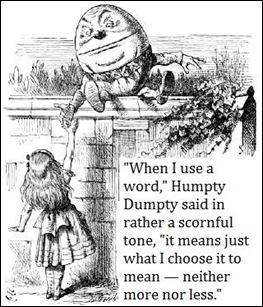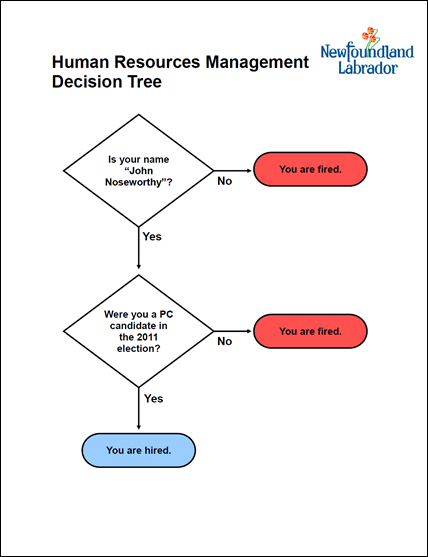Listen closely and you can hear the beep-beep-beep of the garbage truck of government comms as it backs up on the idea of laying off public sectors workers as a result of government’s “review” of programs and spending.
Premier Kathy Dunderdale scrummed [link to CBC’s raw video]outside the House of Assembly on Monday and CBC’s David Cochrane - the guy who on Friday got her to accept the premise that she might lay people – led off the questioning. He repeated comments by public sector union boss Carol Furlong.
Notice that Dunderdale doesn’t talk about layoffs in her first answer except to start out by saying that people need to relax. That isn’t a direct retraction of her comments from Friday, but take a look at the rest of it and you can see where she is going.
Dunderdale claimed that she has said time and again that this is about “good fiscal management” and nothing more. Of course, the truth is that Dunderdale said a great many things, some of them contradictory. Her comment to the media is one of her stock approaches whenever she frigs up. Dunderdale claims she has said the correct thing all along, with the clear implication the rest of us are just not grasping her brilliance. For one of the earliest examples see Dunderdale and the Joan Cleary mess in December 2006.
Dunderdale also said that government needs to “constantly” review programs to make sure they are efficient and effective. Then she referred to some unspecified programs in Joan Burke’s department that are upwards of two or three decades old.
Fair enough.
Except that the government got into its current mess because they didn’t review anything ever. Instead, they just piled on the hiring and piled on the spending with no goals. They had no idea where things were going.
To give you a sense of out far out-to-lunch Dunderdale and her colleagues took things, consider this table from a post back in September 2010.
The Government of Newfoundland and Labrador spends more per person to deliver programs than any other government in Canada, bar none.
In fact, Kathy Dunderdale and her colleagues in cabinet spend more than $3,000 per person more than Alberta does. That’s not good. That’s how grossly inefficient and ineffective they are.
The reason is simple. As with anything in life, if you have no idea where you want to go, you can never tell when you get there or if you get there. So it is that a government that has more money coming through the doors than any of its predecessors has to talk about cuts to spending and layoffs.
In the scrum, Dunderdale said that might be related to the people administering the programs but that permanent employees are safe.
Cochrane comes at the layoffs issue again and this time Dunderdale doesn’t duck. She accepts the potential there might be layoffs. She emphasises that the review is not about what she terms “gutting” the public service She puts the review down to effective management of the public service itself.
Of course, that rings hollow in light of the facts of the matter.
Dunderdale swings to the old line about permanent employees being protected. Then she adds a twist:
… and others can be redeployed
By 2:53 of the scrum though, Dunderdale is back to acknowledging that cabinet has a number of potential cuts in mind. She goes on about how “temporary” means only around for a short time.
By 3:36 in the scrum Dunderdale says she “is not going to lie” about it. Who said anything about lies?
Cochrane then comes back at her to ask what the number is.
So having successfully cooled everyone’s jets in the first couple of minutes, Dunderdale then says she and her cabinet colleagues are considering lay-offs for 800 employees or, “far less than” 800.
And at that point, with a suck of air, someone else takes up the questioning.
Time into the scrum: four minutes.
And in those four minutes, Kathy Dunderdale has changed directions in her messaging twice in completely contradictory directions.
She started by backing the truck up.
And then by four minutes she is in forward gear again and driving right over the same issue she tried to back off of a couple of minutes earlier.
Dunderdale gets a respite from the layoffs for a second as she answers a question about John Noseworthy and his pork-barrel job. Dunderdale does what Joan Burke didn’t do in the House. Dunderdale ties the hire with Noseworthy’s supposed unique skill set.
Then Cochrane goes back to the lay-offs.
“We will look at all of the temporary employees,” said Dunderdale, “the same way we will look at all of the permanent employees.” Of course since permanent employees aren’t being looked at,l this sounds very confused and confusing. And indeed it is.
But there’s that beep-beep-beep again.
However, by 6:00 minutes into the scrum, Dunderdale has said that there will be lay-offs but that the number will be less than 800.
Look at Dunderdale’s face at this point in the scrum as she gets another question about Noseworthy. She’s clearly pissed off. She doesn’t know anybody better qualified to do the job, Dunderdale insists. That is actually part of the problem, of course: hiring people with connections as opposed to qualifications.
In response to another question, Dunderdale does the pre-emptive denial, saying that no one made any promises to Noseworthy when he decided to run in the last election. She puts responsibility for Noseworthy’s job on Joan Burke, saying that Burke brought the name to Dunderdale.
At that point, the scrum switches to other topics. It’s a wonder everyone wasn’t dizzy what with all the shifts of position. Expect more shifting to come.
- srbp -





